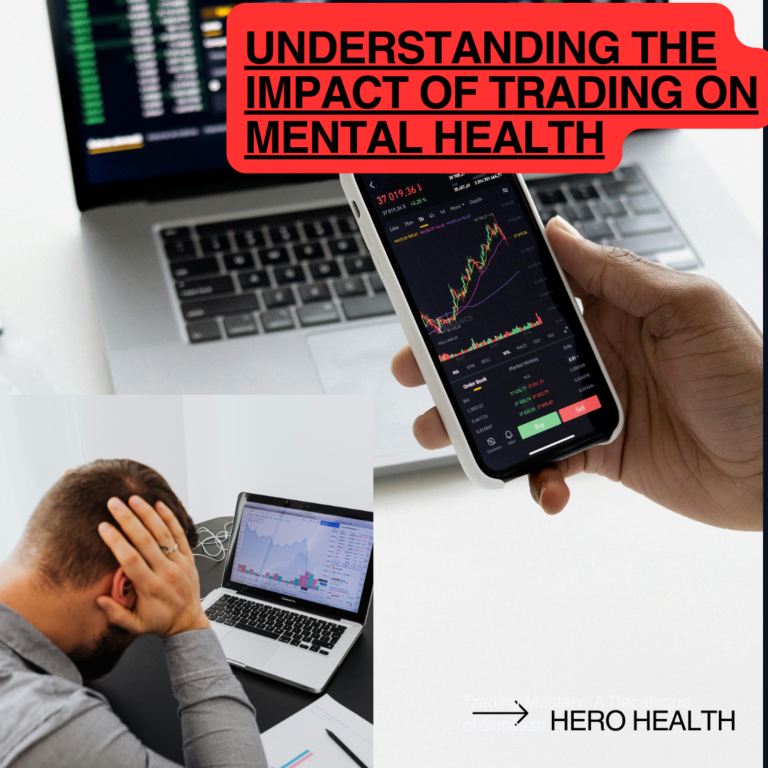Table of Contents
In today’s fast-paced financial world, trading has become a common avenue for individuals to potentially increase their wealth. However, amidst the allure of financial gain, it’s crucial to acknowledge the profound impact trading can have on mental health. In this comprehensive guide, we delve into the various ways trading affects our psychological well-being and provide valuable insights for maintaining mental wellness in the realm of trading.
The Psychological Rollercoaster of Trading
Trading, whether it’s stocks, cryptocurrencies, or forex, often entails significant emotional highs and lows. The volatile nature of markets can trigger intense feelings of euphoria during periods of profit, followed by despair and anxiety during losses. This rollercoaster of emotions can lead to heightened stress levels, emotional exhaustion, and even symptoms of depression and anxiety disorders.
The Pressure to Perform
The competitive nature of trading fosters a constant pressure to perform. Traders are frequently evaluating market trends, analyzing data, and making split-second decisions that can have significant financial consequences. This pressure cooker environment can exacerbate stress and contribute to burnout, as individuals may feel overwhelmed by the relentless demands of the market.
Financial Stress and Anxiety
Trading inherently involves financial risk, and the potential for substantial losses can induce significant stress and anxiety. Fear of losing money, especially if it’s tied to one’s livelihood or financial security, can manifest in various ways, including insomnia, irritability, and difficulty concentrating. Moreover, the fear of missing out (FOMO) can drive impulsive decision-making, further exacerbating financial stress and anxiety.
The Psychological Toll of Losses
Experiencing losses in trading is inevitable, but it’s how individuals cope with these losses that ultimately impacts their mental health. Significant financial setbacks can trigger feelings of failure, self-doubt, and even shame. This psychological toll can erode confidence and lead to a cycle of self-sabotage, where individuals make irrational decisions in an attempt to recoup their losses, only to exacerbate them further.
Strategies for Maintaining Mental Wellness in Trading
Practice Mindfulness and Emotional Regulation
Developing mindfulness techniques and emotional regulation strategies can help traders navigate the emotional ups and downs of trading more effectively. Techniques such as deep breathing, meditation, and cognitive reframing can cultivate emotional resilience and reduce reactivity to market fluctuations.
Set Realistic Goals and Manage Expectations
Setting realistic trading goals and managing expectations is crucial for maintaining mental well-being. Instead of focusing solely on financial outcomes, traders should prioritize process-oriented goals, such as adhering to a trading plan, managing risk effectively, and continuously improving their skills.
Maintain a Balanced Lifestyle
Maintaining a balanced lifestyle outside of trading is essential for mitigating the negative impact on mental health. Engaging in regular exercise, prioritizing adequate sleep, and nurturing social connections can help reduce stress levels and foster overall well-being.
Seek Support and Education
Seeking support from peers, mentors, or mental health professionals can provide valuable perspective and guidance during challenging times. Additionally, ongoing education and skill development can empower traders to make informed decisions and navigate the complexities of the market more confidently.
Conclusion
While trading offers the potential for financial opportunity, it’s imperative to recognize the significant impact it can have on mental health. By understanding the psychological challenges associated with trading and implementing proactive strategies for self-care and emotional regulation, individuals can strive for greater balance, resilience, and well-being in their trading journey.
Frequently Asked Questions (FAQs)
1. How does trading impact mental health?
Trading can impact mental health in various ways. The emotional highs and lows, pressure to perform, financial stress, and psychological toll of losses can contribute to increased stress, anxiety, and even symptoms of depression.
2. What are some common signs of trading-related stress and anxiety?
Common signs of trading-related stress and anxiety include insomnia, irritability, difficulty concentrating, heightened emotional reactivity, and physical symptoms such as headaches or gastrointestinal issues.
3. How can mindfulness help in trading?
Mindfulness techniques such as deep breathing, meditation, and cognitive reframing can help traders cultivate emotional resilience, reduce reactivity to market fluctuations, and make more rational decisions during periods of volatility.
4. What are some strategies for managing trading-related stress?
Some strategies for managing trading-related stress include setting realistic goals, managing expectations, maintaining a balanced lifestyle through regular exercise and social connections, seeking support from peers or mentors, and prioritizing ongoing education and skill development.
5. How can traders mitigate the psychological toll of losses?
Traders can mitigate the psychological toll of losses by reframing losses as learning opportunities, focusing on process-oriented goals rather than solely on financial outcomes, implementing risk management strategies, and seeking support from mental health professionals if needed.







